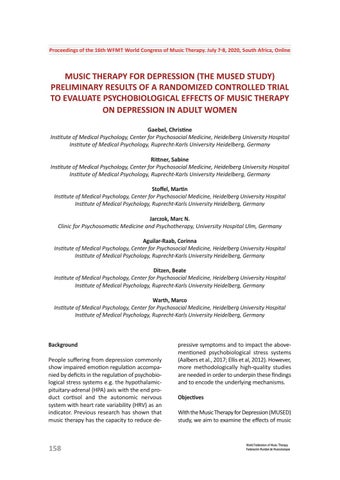Proceedings of the 16th WFMT World Congress of Music Therapy. July 7-8, 2020, South Africa, Online
MUSIC THERAPY FOR DEPRESSION (THE MUSED STUDY) PRELIMINARY RESULTS OF A RANDOMIZED CONTROLLED TRIAL TO EVALUATE PSYCHOBIOLOGICAL EFFECTS OF MUSIC THERAPY ON DEPRESSION IN ADULT WOMEN Gaebel, Christine Institute of Medical Psychology, Center for Psychosocial Medicine, Heidelberg University Hospital Institute of Medical Psychology, Ruprecht-Karls University Heidelberg, Germany Rittner, Sabine Institute of Medical Psychology, Center for Psychosocial Medicine, Heidelberg University Hospital Institute of Medical Psychology, Ruprecht-Karls University Heidelberg, Germany Stoffel, Martin Institute of Medical Psychology, Center for Psychosocial Medicine, Heidelberg University Hospital Institute of Medical Psychology, Ruprecht-Karls University Heidelberg, Germany Jarczok, Marc N. Clinic for Psychosomatic Medicine and Psychotherapy, University Hospital Ulm, Germany
Aguilar-Raab, Corinna Institute of Medical Psychology, Center for Psychosocial Medicine, Heidelberg University Hospital Institute of Medical Psychology, Ruprecht-Karls University Heidelberg, Germany
Ditzen, Beate Institute of Medical Psychology, Center for Psychosocial Medicine, Heidelberg University Hospital Institute of Medical Psychology, Ruprecht-Karls University Heidelberg, Germany
Warth, Marco Institute of Medical Psychology, Center for Psychosocial Medicine, Heidelberg University Hospital Institute of Medical Psychology, Ruprecht-Karls University Heidelberg, Germany Background
People suffering from depression commonly show impaired emotion regulation accompanied by deficits in the regulation of psychobiological stress systems e.g. the hypothalamicpituitary-adrenal (HPA) axis with the end product cortisol and the autonomic nervous system with heart rate variability (HRV) as an indicator. Previous research has shown that music therapy has the capacity to reduce de-
158
pressive symptoms and to impact the abovementioned psychobiological stress systems (Aalbers et al., 2017; Ellis et al, 2012). However, more methodologically high-quality studies are needed in order to underpin these findings and to encode the underlying mechanisms.
Objectives
With the Music Therapy for Depression (MUSED) study, we aim to examine the effects of music
